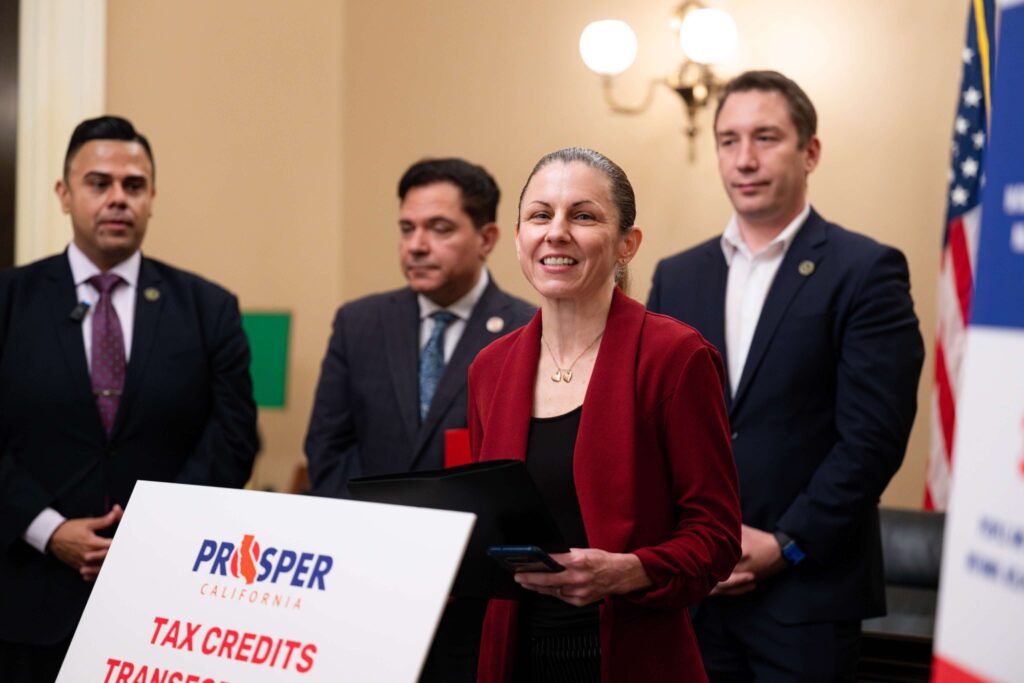Last year, about 3.5 million workers were able to claim the California Earned Income Tax Credit on their tax returns. Together with the Young Child Tax Credit and Foster Youth Tax Credit, the CalEITC put about $1.4 billion back into the hands of Californians with low incomes – money helping families cover essentials like food, diapers, transportation, and medical expenses.
The CalEITC was established in 2015 to build financial security for Californians struggling to make ends meet. Now, a decade later, it is worth taking a moment to commemorate this historic legislative win and the formidable movement that made it possible.
Building Momentum
For years, the California Budget & Policy Center and advocates pushed California to establish a state version of the Federal Earned Income Tax Credit, a tried-and-true policy replicated in a majority of states across the country.
“It’s a way to get cash easily to people through the tax code,” said Executive Director Chris Hoene. “It’s a very good anti-poverty policy — one of the best the country has.”
When a window of opportunity opened up on the heels of the Great Recession, the Budget Center team worked closely with advocacy partners to map out options and present a strong case to the Legislature. This people-powered campaign paved the way for the creation of the CalEITC in 2015, initially providing about $200 million in tax credits to nearly 400,000 workers, and their families, throughout California.
Building Collective Power
While the establishment of the CalEITC was in itself a groundbreaking victory for the state, the tax credit was nowhere near as robust as advocates had been demanding. Given that the original CalEITC was significantly limited and excluded many populations, it was critical to grow and expand the credit in order to lift more Californians out of poverty. So we did just that.
The Budget Center stepped into a co-leadership role in the CalEITC Coalition, providing research and technical assistance to craft a multi-year strategic agenda. At the time, the coalition was composed of various organizations, including United Ways of California, Children’s Defense Fund of California, County Welfare Directors Association, Western Center on Law and Poverty, and many more. Each organization brought a different lens to the table, enhancing the coalition’s collective power by leveraging its unique strengths, expertise, and perspectives.
“It’s really helpful to have different ways of looking at the work,” said now-Policy Director Alissa Anderson, who represents the Budget Center in the CalEITC Coalition. “All of us have the same end goal, which is: How do we get more money to people?”
Over the next few years, the CalEITC Coalition successfully advocated to extend the credit to people who were initially excluded due to self-employment, age, or immigration status. The state also expanded eligibility by more than doubling the income limit and increased the amount that people can receive in tax credits. These expansions have enabled the CalEITC to support more than 1 million people locked out of claiming the federal EITC.
Building Financial Security
The CalEITC now reaches millions of Californians up and down the state each year, providing a cash infusion for individuals and families to cover basic needs like housing, food, and healthcare. The policy has become a powerful tool to not only combat poverty in California, but also promote racial and gender equity.
“At every stage of the establishment and expansion of the California Earned Income Tax Credit, the Budget Center has been really key to providing policymakers with the rationale, with the options, with looking at implementation challenges and thinking about its fiscal effect,” said Jason Sisney, Budget Director for the Speaker of the California State Assembly.
But we don’t do any of this alone. The Budget Center’s data and research expertise is only one piece of the puzzle. The success of the CalEITC is a powerful example of how policy and budget conversations are strengthened and enriched when diverse voices — especially those from the most impacted communities — come together around shared values and goals to move California forward.
Today, the CalEITC Coalition has rebranded as Prosper California and consists of 46 member organizations. The coalition has bold proposals to continue leveraging the tax system to cut poverty and close the racial wealth gap in the state. Together, we will foster a more just and equitable California where everyone has the resources and opportunities they need to thrive.
Current Prosper California Members
Alameda County Community Food Bank
All Home
Bay Area Regional Health Inequities Initiative
California Association of Food Banks
California Budget & Policy Center
California Catholic Conference
California Immigrant Policy Center
California Labor Federation
California Pan-Ethnic Health Network
California Welfare Directors Association
California Women’s Law Center
Courage California
Economic Security Project Action
Equal Rights Advocates
First 5 Association of California
Friends Committee on Legislation of California
Golden State Opportunity
Golden State Opportunity Foundation
GRACE/End Child Poverty in California
Greenlining Institute
Inland Equity Partnership
John Burton Advocates for Youth (JBAY)
Justice in Aging
La Familia Organization
Latino Community Foundation
Long Beach Immigrant Rights Coalition
Lutheran Office of Public Affairs California
Órale
National Association of Social Workers – CA Chapter
NextGen California
Nourish California
Orange County United Way
Rise-Economy (Formerly California Reinvestment Coalition)
San Diego for Every Child
SEIU California
State Treasurer’s Office
The Children’s Partnership
United Way Bay Area
United Way California Capital Region
United Way of Merced County
United Way of San Joaquin
United Way of Santa Cruz County
United Ways of California
United Ways of California Capital Region
Universal Income Project
Western Center on Law and Poverty
Young Invincibles




